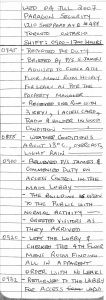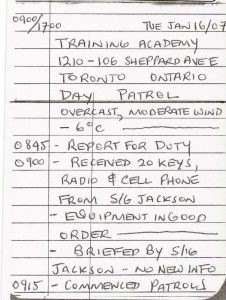Memo-Book Components
Purpose of Memo-Book
Security Guards provide reports to the client to convey vital information when the client is not present and to document significant incidents, circumstances, or conditions that require a written record. It’s essential to maintain a vigilant awareness of your surroundings and report any noteworthy observations at the site.
Notes serve as a reference to guide your activities. When you’re new to a site, make notes about your patrol activities and duties. This allows you to refer to them when you’re not accompanied by a trainer or supervisor, reducing the need for frequent returns to the office to review post orders or work instructions.
Your notes will assist you in composing your final reports for the client, containing essential details like activities, incidents, times, names, dates, descriptions of individuals and objects, and even statements or witness signatures. Don’t hesitate to include relevant drawings or diagrams in your notebook for clarification.
Moreover, your notes act as a memory aid, considering the substantial amount of crucial information that must be documented throughout your shift. In the event you need to appear in court, your notebook will help jog your memory, as recollection may fade over time, especially for significant cases.
A properly maintained notebook is admissible in court as a memory aid, potentially serving as documentary evidence, provided that proper procedures are followed both at the time of the event and during court proceedings.
Additionally, notebooks assist in gathering intelligence or investigative information, as seemingly insignificant pieces of data may not appear relevant individually but can prove significant when consolidated through meticulous note-taking and reporting.
General Best practices for memo books
Ensuring that all reports are based on facts rather than biases or opinions is of utmost importance. Without careful consideration, it’s easy to draw conclusions that lack a factual basis. For instance, someone might seem intoxicated when they are actually unwell.
Notes should be documented promptly after an event or activity to retain their value. Typically, the recommended practice is to make an entry in your memo book at least every twenty minutes. In the case of significant events, there’s no such thing as including too much information in your notebook.
A memo book designed in the style of law enforcement or police usually includes a cover with designated spaces for entering essential identifying information like your company name, your name, employee number, and the date range of the entries (first date and last date). These notebooks are typically compact enough to fit in the pocket of a uniform shirt or jacket. Some may have a hard or soft cover to protect the memo book from wear and tear, as well as environmental factors. Most of these notebooks feature numbered pages to adhere to legal requirements and maintain the integrity of recording notes at the time of an event, without adding information later.
If your employer does not supply you with a notebook, you will need to either purchase one that meets these guidelines or create a custom notebook with numbered pages and other essential details following the best practices outlined in this training program.
Memo books should be kept on your person during your shift or workday and securely stored when not in your possession to safeguard any sensitive and confidential information they may contain. Notebooks must be retained by your employing agency as outlined in the Ministry standards. To facilitate this, you should turn in your memo book to your employer for safekeeping each time one is filled out, and a new memo book should be provided at that time.
In most cases, Security Guards use only one memo book at a time. An exception might arise when a Guard is regularly assigned to a specific site but also frequently works for the same company in other roles or at different sites to earn overtime pay. In such situations, the Guard may maintain one memo book for the regular site and another for the overtime duties, which could be labeled as the “Float” or “Field Support” memo book, for example. Maintaining control of your notebook is crucial because it contains confidential information such as event descriptions, telephone numbers, addresses, etc. Losing it could result in the notes being regarded as never having been written
The guidelines you’ve provided pertain to maintaining a security guard’s notebook and taking notes during their duty. Here’s a summary of these guidelines:
- Preservation: Pages should not be removed from the notebook.
- Chronological Order: All notebook entries should follow the correct chronological sequence.
- Late Entries: If you forget to include something in your notebook, make a late entry with a note indicating it’s a late entry and provide the information.
- Thorough Notes: Keep detailed notes; you can never write too much when something important happens.
- Collaboration: If two guards are involved in an occurrence, they can discuss it and each complete their own notes, sharing information.
- Handwriting: If your handwriting is difficult to read when writing quickly, it’s acceptable; you can interpret your notes when giving evidence. Consider using the back section for source notes.
- Professionalism: Do not make written entries of a personal nature in your notebook; it is a work document.
- Statement Review: When taking statements, have the person review what you’ve written and sign it. If giving statements to the police, consider writing it in your memo book, photocopying it, and signing the photocopy for your record.
- Language: Use professional and appropriate language.
- Reference Section: Keep emergency numbers, frequently used numbers, and important information in the reference section at the back of your notebook.
- Essentials: Ensure your notebook includes essential information and details about your duty, such as dates, site information, on/off duty times, shift details, weather conditions, briefing information, equipment condition, and dispatch calls.
Maintaining accurate and detailed notes is crucial for security guards to document incidents, activities, and observations during their duty and to serve as a record if needed for investigations or legal purposes.


You should have four components to your memo book. They are:
- Heading
- Opening
- Body
- Closing
Heading
This is the section that includes details such as a 4-part date, start time of your shift and location of where you are working
Opening
In the opening, you should include the time you reported for duty, who briefed you and any equipment received, and a signature of officer transferring equipment.
Body
This is the detailed part of your report. It includes any specific details (who, what, where, when, why & how). You should make an entry minimum every hour or as events occur.
Closing
In your closing, you should include the time you briefed your relief, the time you check off duty, and a signature on your last line of entry.
